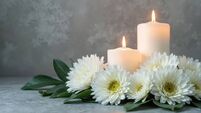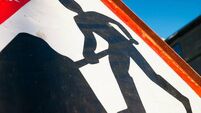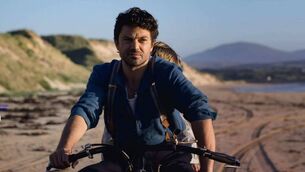Former President leads tributes at Funeral Mass for ‘uniquely talented’ photographer Henry Wills
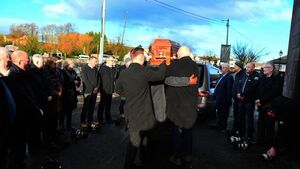
Members of the Press Photographers’ Association of Ireland formed a poignant guard of honour by leaving their cameras on the ground as Henry Wills’ coffin was carried from St Muredach’s Cathedral after his Funeral Mass. Picture: John O’Grady
Henry Wills was remembered as one of the outstanding press photographers of his generation at his Funeral Mass in St Muredach’s Cathedral in Ballina last Tuesday week.
Friends, photographers and former work colleagues travelled from all over the country on a bitterly cold January morning to join Henry’s family in saying farewell to a uniquely talented man who has left such a rich and varied legacy in his native Ballina, Mayo and the wider western region.
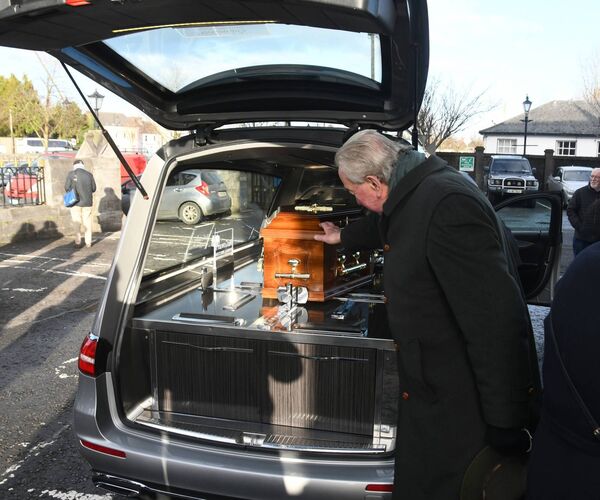
At the start of the Funeral Mass, chief celebrant Fr Brendan Hoban read a message from former President of Ireland Mary Robinson, a long-time friend of Henry. Mrs Robinson, who was unable to attend the service, said she and her husband Nick were “deeply saddened” to learn that Henry had died just weeks after launching his wonderful book In All Kinds of Weather.
“It was a great pleasure to be with so many of you for the recent launch of In All Kinds of Weather at Mount Falcon and to see a happy Henry enjoying all the deserved praise for his photographic skill. I called him a maestro at the time, acknowledging his immense ability in capturing the people and the events in the West of Ireland over decades. He had a unique ability to photograph children in their local context and show the character of each child.
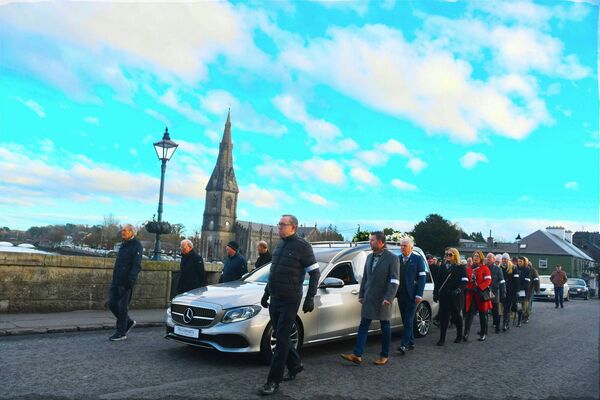
“But, as I said to Henry on that occasion, people were not only there to admire his immense talent as a photographer. They were there for Henry the man. There was an incredible warmth and love in the room, as people recalled fun moments with Henry in the past and spoke of his kindness, his generosity and the ability to put everyone at their ease.
“Henry was held in high esteem by the photographic world in Ireland and now - thanks to the generous support of his colleagues in the Western People and The Irish Times - we can all continue to enjoy his legacy.”
One of the features of the Funeral Mass was a beautiful commemorative booklet, produced and designed by Siobhan Foody-Bourke, wife of Henry’s nephew Keith. Many of the mourners remarked on the impressive booklet, which contained lots of evocative photographs of Henry over the years.
In celebrating the Funeral Mass, Fr Hoban was assisted by fellow clerics Fr James Corcoran, Fr Tommy Towey, Fr Dan O’Mahony, Mgr Martin Keveny, Fr Michael Harrison, Mgr Sean Killeen, Fr Anthony Gillespie and Fr Aidan O’Boyle.
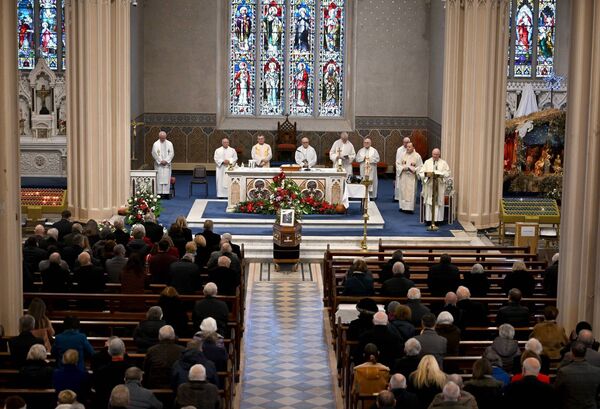
The First Reading was read by Henry’s niece Elaine Bourke while the Second Reading was read by Dr Seamus Caulfield, a long-time friend of Henry.
In a moving homily that evoked many fond memories, Fr Hoban referred to Henry’s “great capacity for friendship and connection”.
“He seemed to know everyone and everyone felt they knew Henry. Friendship was part of the very weather of his life.”
Fr Hoban said Henry was a very creative man who readily gave of his special talents to a host of community organisations.
“Henry was a great encourager, praising initiatives, favouring creative ideas, thinking outside the box, asking Why not? rather than asking Why?, helping those who needed a hand.”
But it was Henry’s sterling work in the Western People over the last 40 years for which he would be most fondly remembered. Fr Hoban said Henry was seen as the Western’s “most recognisable public face” and was known far and wide for his peerless skills as a photographer.
“Henry was captivated by the camera and it became the signature instrument of his life. The camera would not only define his work and his life and his legacy as a professional photographer but it also became the lens through which Henry viewed the world.
“It’s not, I think, too extravagant a claim to suggest that Henry became and remained for over four decades the public face of the Western People, loyal and supportive in equal measure, in good times and in bad, committed week in week out, year in year out to the ever-constant demands of a weekly newspaper.
“And just as the camera became his chosen instrument of choice that allowed him to make his mark in the world, the Western People was at the very heart of Henry’s life’s work providing him with a platform in which he refined his natural talent in photography and the expertise that was so admired and respected by his professional colleagues and that was, as we know, rewarded with awards and honours.
“Henry’s fame as a photographer was noted, far and wide, especially his eye for a telling picture.”
Referring to the recent launch of Henry’s book, In All Kinds of Weather, Fr Hoban said the turnout that night reflected the esteem in which Henry was held by the people of Ballina.
“The launch was a statement by the people of his beloved Ballina, who turned out in droves at its launch to honour him; it was a testament to the respect and the warmth in which Henry was held by his own people and in his own parish; and it established his place not just in the history of Ballina but in the hearts of its people.”
Fr Hoban said Henry had faced his final weeks with “great courage and resilience”.
“Even though it was difficult, he never complained and he retained to the end that positive optimistic spirit that was a hallmark of his life.”
Prayers of the Faithful were read by Neil McHale, Brendan Ruddy, Donna McGinty, Adrian Bourke, David Farrell, Terry McCole and Martha O’Shaughnessy.
The participants in the offertory procession were Frank Melia (basketball), PJ Melia (‘Seventh Son’ plaque, in reference to Henry being called the seventh son in the Melia household), Tommy Cooke (miniature piano), Dermot O’Shea, retired picture editor of The Irish Times and a friend of Henry (camera), Brenda Fitzsimons, current picture editor of The Irish Times and a friend of Henry (Press Photographers’ Association of Ireland award), James Laffey, Western People editor (copy of the Western People), Gerry Coyle, (copy of Henry’s book In All Kinds of Weather) and Freddie Foster and Mary Martin (bread and wine).
One of Henry’s great loves was the Moy Singers who provided the music for the Funeral Mass. Their stunning rendition of Simon and Garfunkel’s Bridge Over Troubled Water - one of Henry’s favourite songs - was a fitting farewell to an old friend and colleague. Indeed, for many in attendance, it perfectly encapsulated the multi-talented man they knew and loved, and will remain one of the stand-out memories of a very moving Funeral Mass.
In another nod towards Simon and Garfunkel, retired Western People editor Terry Reilly read the lyrics from Bookends, the Simon and Garfunkel song that Henry had quoted on the final page of In All Kinds of Weather.
Time it was,
And what a time it was
It was...
A time of innocence
A time of confidences
Long ago... it must be...
I have a photograph
Preserve your memories
They’re all that’s left you.
In a wide-ranging and heartfelt eulogy, Henry’s nephew, Keith Bourke, a reporter with the Western People for the past 15 years, reflected on his uncle’s life and legacy. He said Henry was “an institution and a part of the fabric” of Ballina.
“Not content to just document his hometown, Henry was at the heart of Ballina life. He threw himself wholeheartedly into community organisations, helping to reignite the Ballina Salmon Festival, and showcasing his musical and acting talents through the Moy Singers and the local Dramatic Society amongst many other groups.”
Keith said Henry’s work with the Western People took him the length and breadth of the county and he possessed an encyclopaedic knowledge of Mayo and its terrain.
“The Western People was everything to Henry. As the paper’s current editor James Laffey remarked last week, Henry treated his job like a vocation.
“Henry would burst into the Western People offices like a whirlwind, always full of vim and vigour.
“The Western and its photographic department was Henry’s fiefdom. Often referred to by his colleagues as An Rí, the king of the lens, he was a benevolent ruler, most of the time!”
Keith said he had the privilege of working alongside Henry for a spell in the Western and it was “one of the proudest periods of my life”.
“Henry made the job of a journalist easy. When you went out on a story with Henry, even if the subject hadn’t a clue who I was they definitely knew who Henry Wills was! His incredible way with people meant their stories and words would tumble out before you even had time to open your notebook.
“Henry would often impress upon me what was truly important about the Western. And that was the Western’s people. The communities the paper serves. Henry never lost sight of that. It didn’t matter if the story was in Bohernasup or Blacksod, he would pour his heart and soul into delivering what those communities deserved.”
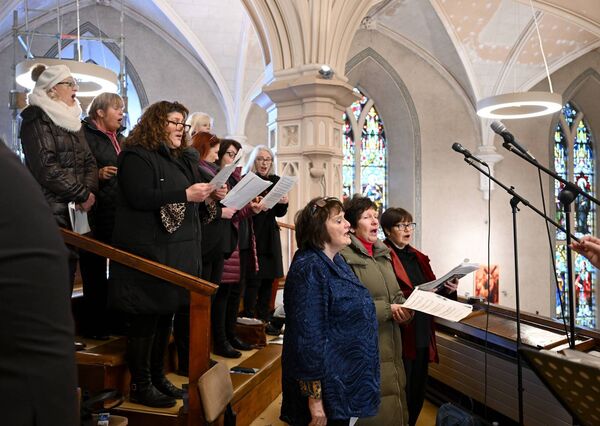
Keith said Henry was also very generous with his knowledge and served as a mentor to numerous photographers and reporters. However, there were some things Henry just couldn’t teach because they came naturally to him.
“What made Henry great simply could not be taught. His talents in photography and almost everything he did were innate.
“That was because Henry’s unique and charismatic personality lit up everything he touched.
“When he took your photograph you weren’t looking down the barrel of a lens you were looking at Henry Wills. So many of his photographs reflected back the fun and warmth Henry imbued in others.
“He had this uncanny ability to read a room immediately. He could disarm with a joke or a witty comment and display tenderness and understanding if that’s what the situation required.
“He had a warmth, and a kindness, and a generosity that few could rival.”
Keith said Henry’s recently-published book will “serve as a lasting legacy and a timeless tribute to one of the greatest press photographers of his generation”.
“The launch of Henry’s book was an astonishing night. Henry was able to bask in the adulation that he so richly deserved.
“Henry was in his element, sharing stories and reminiscing with so many old friends. The love in the room that night was palpable, and Henry felt it too.”
Keith said his uncle had a particular affinity with the Press Photographers’ Association of Ireland (PPAI), the representative body for national and regional press photographers in the Republic and Northern Ireland.
“He was a past president of the association and picked up numerous accolades. But it was the respect and friendship of his peers that really moved him.
“His great friend Dermot O’Shea told me that Henry devised a special system to keep track of all the photographers and their work at awards time.
“The pen and paper system was flawless and efficient but the only problem was that to anyone else but Henry it resembled hieroglyphics!”
Keith said his uncle displayed a flair for drama from a young age and his mother Beatrice was worried he might “run away and join the Abbey Theatre”.
“Henry may not have ended up treading the boards with the Abbey [but] the rest of the world was his stage. His camera was wielded like a conductor directing an orchestra and Henry truly was the Maestro.”
Apart from his acting talents, Henry was also a brilliant musician who was noted for his piano playing.
“Music flowed from Henry’s soul. Even his voice and his infectious laugh were musical. When Henry took to the piano he would enthrall and entertain.”
Keith said his uncle was a “hugely intelligent and cultured man [who] was an authority on music, literature, film, and politics.
“He possessed a wit and a turn of phrase that was unmatched. Henry’s use of language was incredible. He had a vocabulary of terms and phrases that were almost entirely unique to him and could be rolled out for whatever the situation desired. I like to call them ‘Henryisms’.
“A fabulous raconteur, when Henry was delivering an uproarious anecdote, the phrase ‘Between the jigs and the reels’ would be slotted in to inform you that his rarely short story was reaching a hilarious crescendo.”
Referring to Henry’s basketball career, Henry said his uncle was among a group of talented basketballers who paved the way for the explosion of the sport in Ballina.
“When he hung up his hi-tops he remained obsessed with the game and delighted in Ballina’s on-court successes. What Henry treasured the most during his long association with basketball in Ballina was the lasting friendships he formed.”
Keith said he and his sister Elaine were “lucky” to have Henry in their lives.
“Our house would come alive when Henry would bound through the door. His love for us was unconditional and immense and we adored and idolised Henry.”
Keith said his mother, Mary Bourke, shared a unique bond with her brother and sole sibling.
“If anyone is sceptical about the special connection that exists between twins well then they clearly never met this pair. Their bond was unbreakable and unshakeable and will remain so for eternity.”
Keith said family and friends will mourn the loss of Henry but the “right thing” to do was to remember the joy and laughter he brought into people’s lives.
“The right thing is to remember all the happy times we had with Henry, all the fun, and all the love. We will always love you Henry and you will be in our hearts forever.”
Members of the PPAI formed a guard of honour as Henry’s coffin was carried from the church to the strains of How Great Thou Art. In a symbolic gesture, the photographers laid their cameras on the ground as a final tribute to a great friend and colleague.
As Henry’s cortege was leaving the grounds of St Muredach’s Cathedral, the photographers, led by Dubliner Ray McManus - founder of the Sportsfile photographic agency and one of Henry’s oldest and dearest friends in the PPAI – delivered a rousing three cheers, which is a traditional farewell by the PPAI to one of their deceased colleagues.
A guard of honour consisting of current and former Western People staff accompanied Henry on his final journey along the banks of the River Moy to his resting place at Leigue Cemetery.
Fittingly, the guard of honour was led by current editor James Laffey and retired editor Terry Reilly, the two editors who served alongside Henry for almost all of his distinguished career from 1972 to 2020.
Henry was laid to rest beside his parents, Harry and Beatrice, in Leigue Cemetery.
May his gentle soul rest in peace.
